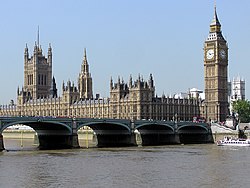History
| Year | Event |
|---|
| 1980s | Office first suggested |
| 1989 | POST launched (with charitable funding). Among other support, the UK Centre for Economic and Environmental Development raised funds to provide POST with its first in-house environmental specialist adviser. |
| 1992 | POST was adopted as Parliamentary body by both Houses of the UK Parliament and subjected to five year reviews. The UK Parliament made POST a permanent institution in 2001, after Dr Ian Gibson MP, POST's Chairman, Lord Flowers - vice-Chairman and Professor David Cope, Director, presented evidence to the then House of Commons Administration Committee to support the decision, which was endorsed later by the House of Lords. |
Since 1939, a group of MPs and peers interested in science and technology, through the first parliamentary "All Party Group", the UK Parliamentary and Scientific Committee [2] (P&S), had encouraged UK Parliamentarians to explore the implications of scientific developments for society and public policy. As the UK economy became more dependent on technological progress, and the varied effects of technology (especially on the environment) became more apparent, it was felt that UK Parliament needed its own resources on such issues. Parliamentarians not only required access to knowledge and insights into the implications of technology for their constituents and society, but also needed to exercise their scrutiny functions over UK government legislation and administration. This thinking was also influenced by the fact that specialised parliamentary science and technology organisations already existed overseas.
P&S members (Sir Ian Lloyd MP, Sir Trevor Skeet MP, Sir Gerry Vaughan MP, Lords Kennet, Gregson and Flowers among others) visited already established organisations in the US, Germany and France, and this reinforced their view that modern Parliaments needed their own ‘intelligence’ on science and technology-related issues. Initially, they asked the then Thatcher government to fund such services at Westminster but were asked first to demonstrate a real need. This led to the P&S creating a charitable foundation to raise funds from P&S members.
The parliamentary reaction was positive and led to the appointment of a first Director, Dr Michael Norton. In 1989, POST was formally established as a charitable foundation, though not an internal part of Parliament.
POST had attracted more resources by 1992 and then recruited 3 specialist science advisers and began its fellowship programme with the UK research councils.
In 1992, the House of Commons Information Committee, supported by the House of Lords, recommended that Parliament should itself fund POST for 3 years, and a subsequent review in 1995 extended this for a further 5 years. This was the result of POST demonstrating real interest and demand from MPs and peers.
POST's financial reliance on donations from bodies external to Parliament, even those as prestigious as the Royal Society, had always slightly compromised the perceived independence of the office.
From 1997, the chair of the POST board was appointed by government Whips. Since then, chairs have been Dr Ian Gibson MP 1997-2001, Dr Phyllis Starkey MP 2001-2005, and Dr Ashok Kumar MP 2005-2010. Dr Kumar died shortly before the UK 2010 General Election. Since then, subject to parliamentary approval, the Chair of POST has been Adam Afiyie, MP.
In 1998, Professor David Cope took over as Director of POST. He guided the Office towards the goal of establishing POST as a permanent office of the UK Parliament - and dramatically expanded its staffing, wider links and more general recognition of its role as a special, distinctive, institution that the UK Parliament had agreed, enthusiastically, to endorse.
In 2001, both Houses decided that POST should indeed be established as a permanent bicameral institution, funded exclusively by Parliament itself, through the two Houses, in a ratio of 70%/30%, Commons/Lords.
In 2009, POST celebrated its 20th anniversary with, among other events, a special conference, arranged by the Director, Prof Cope, on "Images of the Future". The keynote participants were the Hon. Bart Gordon, Chair of the US House of Representatives' Committee on Science and Technology and Dr Jim Dator of the University of Hawaii Futures Research Centre, along with many other Members and staff of Parliaments across the world.
Because of the enthusiasm of Members of both Houses, POST had enjoyed a unique status within Parliament. It was from its inception attached administratively to the House of Commons COMMISSION (though always with its link to the House of Lords.)
This arrangement was intended specifically to distinguish the office and its functions from the Libraries of either House. These conduct non peer-reviewed "studies", of varying quality. POST - on the other hand - was expected to provide proactive analysis and options, freed from the immediate pressure of political or administrative expectations, trying to embrace futures thinking, and above all, to subject all its work to the most critical peer review analysis.
POST'S Director, Prof David Cope, returned to Cambridge University in 2012 and Dr Chris Tyler was appointed to lead POST by parliamentary authorities.
Dr Tyler left POST in 2017 for a policy position at University College London.
The Acting Directorship of POST was taken over by a longstanding staff member, Dr Chandrika Nath. In 2018, in an acknowledgement of POST's immutable science and technology assessment role, she was appointed Executive Director of the international Scientific Committee on Antarctic Research, the highly prestigious intergovernmental organisation.
Dr Grant Hill-Cawthorne (University of Sydney) became Head of POST from May 2018.
